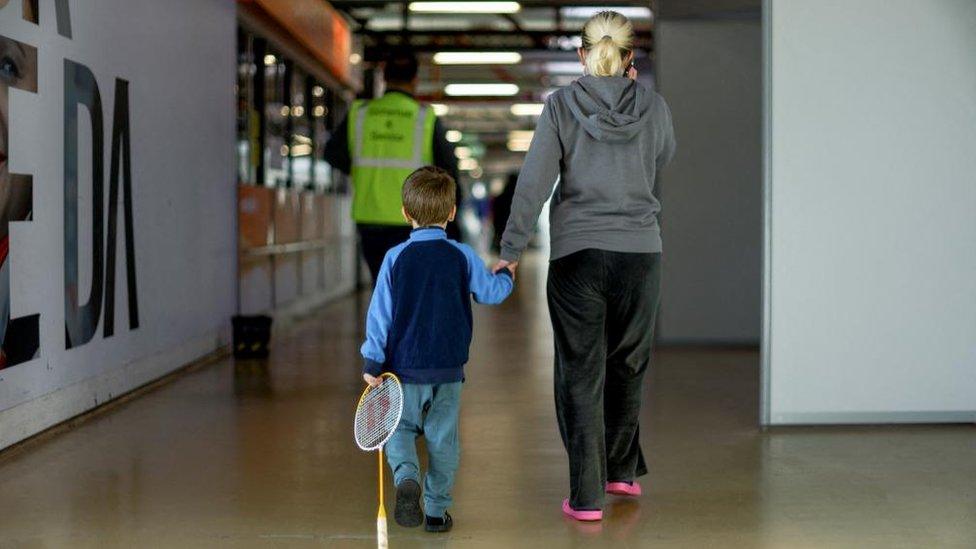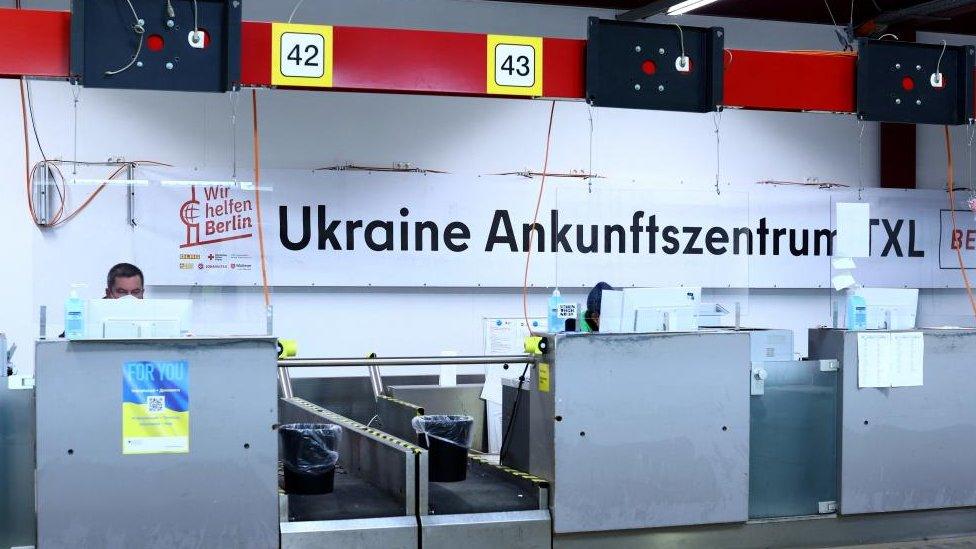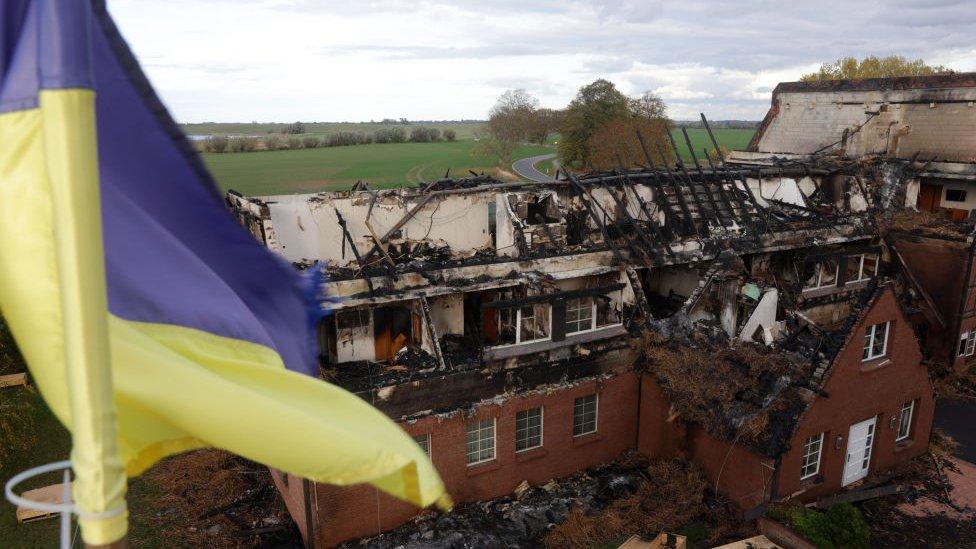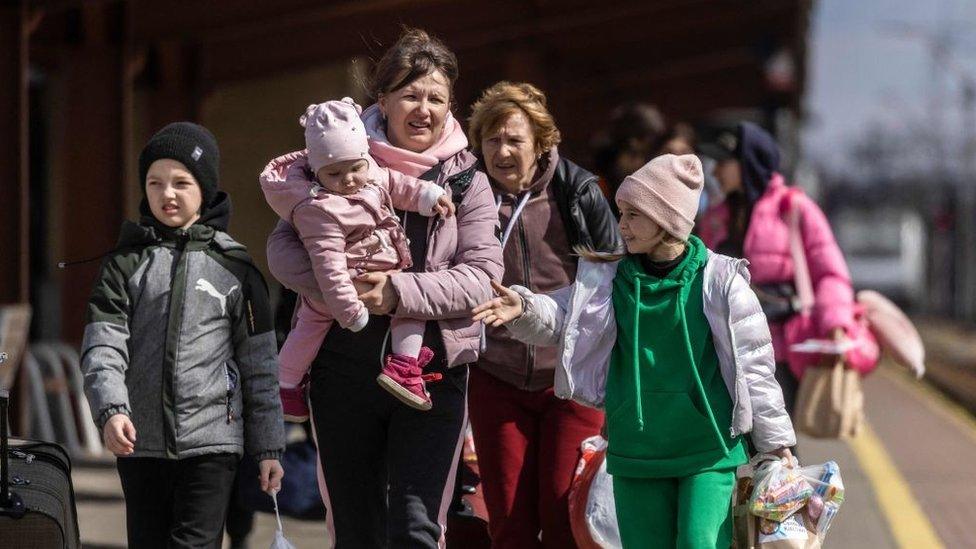Ukraine war: Germans struggle with influx of Ukrainian refugees
- Published

Latest figures say one million Ukrainians have fled to Germany since the start of Russia's full-scale invasion in February
On an old airfield, on the outskirts of Berlin, almost 1,000 people sleep in giant heated tents. The German capital is struggling to properly house Ukraine's refugees.
And, as winter deepens and Russia continues to attack Ukraine's energy infrastructure, authorities here are hastily preparing more emergency shelters in anticipation of the arrival of what they estimate could be up to 10,000 more people.
A million Ukrainians have fled to Germany since the start of the war, according to latest figures.
That has awakened memories of 2015 and 2016 when a comparable number of people sought asylum here.
As then, Germany initially extended a warm welcome. But there are now growing concerns about how best to accommodate such a large number of people.


In Berlin, around 100 Ukrainians arrive every day at the city's main reception centre for refugees which is sited in a terminal at a converted former airport.
Workers in brightly coloured tabards lead them past defunct baggage carousels to the old departure halls which are now filled with crowded trestle tables.
There's food here, medical aid and a bed for a few nights.
It's designed to be temporary; strangers sleep in bunks in shared cubicles or tents.
But many of the people here will stay longer; it's getting harder to find permanent accommodation in a city where the rental market is under pressure, and sending people on to other parts of Germany is getting harder too.

Germany is now housing many refugees at Berlin's former Tegel airport
Operations manager Kleo Tümmler admits it's a challenge: "We are built to take care of people for a few days. Sometimes they have to stay here for two weeks, maybe three weeks."
Despite the logistical difficulties, there's a relaxed atmosphere in the centre.
Ms Tümmler and her colleagues appear committed to making life as easy and comfortable as possible for the people here.
They're trying to adapt to the needs of longer-term guests. They've bought washing machines, they're trying to provide some entertainment, and they're extending the educational facilities for the 300 children on site, some of whom are home-schooling via video link to their Ukrainian schools.
They have learnt, they say here, from the experience of 2015.
But their positivity is not mirrored elsewhere.
One politician from northwest Germany recently used an editorial in a national newspaper to warn that communities like his were "massively challenged" by numerous Ukrainian refugees as well as a growing influx of asylum seekers.
The number of people seeking asylum has indeed risen, fuelled largely by people from Syria and Afghanistan.
I expect tens, if not hundreds of thousands more Ukrainian women and children... already more migrants are living in many communities than in the year of the 2015-16 refugee crisis

Frederik Paul said he was reminded of the atmosphere during the migrant crisis when an initially warm welcome gave way to a bitter national debate over how much support Germans could and should offer to those seeking asylum.
He echoed comments made earlier in the year by Martina Schweinsburg, a district councillor from Thuringia, who said her area had relied on private landlords to house Ukrainians - mainly women, children and elderly people at first - but were now reluctant to do so.
Turning over school gyms for emergency accommodation was, she said, something the public increasingly considered unacceptable.
"Our capacities are exhausted," she said. "Our backs are against the wall."
The mood is darkening; the authorities recorded 65 attacks on refugee accommodation so far this year, a significant increase on 2021.

This hotel sheltering Ukrainian refugees was burned down in a suspected arson attack last month
And a recent survey for the national broadcaster found that concerns about immigration had increased in the last year: 53% of those asked were concerned that too many people were coming to Germany, up by 11% from September 2021.
Those fears and that social division are exactly what Russia's Vladimir Putin has sought to exploit in his latest campaign to render Ukraine uninhabitable and drive yet more of its citizens into Europe.
That will test the tolerance of this German government, which came to power with a far more liberal attitude towards refugees than its predecessor.
How this country, itself much changed by the experience of the migrant crisis, reacts will matter.
- Published26 November 2022
- Published25 October 2022

- Published7 October 2022
